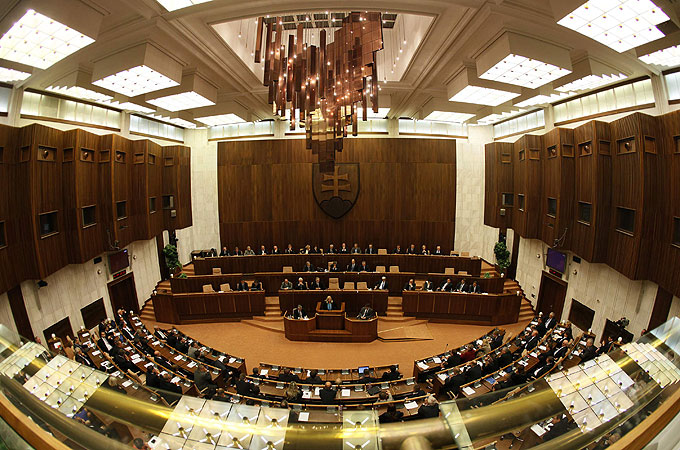Slovak government falls on eurozone vote
Coalition government, which had pegged its survival on passage of euro zone’s rescue fund in parliament, collapses.

 |
| SaS party, one of the coalition partners, voted against the deal, saying EFSF was against interest of Slovakia [Reuters] |
Slovakia’s parliament has brought down the government by rejecting a plan to expand the euro zone’s European Financial Stability Facility [EFSF] rescue fund, crucial to containing a spreading debt crisis.
However, the outgoing finance minister, Ivan Miklos, said on Tuesday the plan could still be approved by the end of the week.
“There is an assumption that the EFSF, one way or the other, will be approved by the end of the week,” Miklos told parliament ahead of the vote.
Iveta Radicova, the Slovak prime minister, had made the issue into a vote of confidence to try to prevent one of her coalition partners, the liberal Freedom and Solidarity (SaS) party, from opposing the EFSF, but in vain.
The count showed 55 votes in favour and nine against out of a chamber of 150 deputies. The remainder, including the 22 SaS deputies, were absent or did not register a vote, and a majority of all seats was required for the motion to pass.
Radicova is expected to call another vote that is likely to pass comfortably with the support of the main opposition party, Smer, which had demanded a reshuffle or resignation as the price for its support.
Opposition ready to support
The leftist opposition Smer party has repeatedly said it supports the EFSF plan in principle and is ready to discuss backing it once the government is out of office.
“Smer is curious to see what the ruling coalition parties will propose in return for a fast-track vote and approval of this vital document for Slovakia,” Robert Fico, Smer’s leader and former prime minister, told parliament.
“Smer is ready for this discussion.”
A senior Smer official said he believed a new vote would be held “as soon as possible”.
After Malta approved the EFSF late on Monday, Slovakia was the last of the 17 member states to ratify the deal.
SaS party had argued that one of the poorest members in the Euro zone should not have to pay for the huge debts racked up by richer states like Greece or Italy.
Under the agreement, Slovakia would have to provide guarantees worth 7.7bn euros ($10.2bn). The SaS also wanted an opt-out provision from the European Stabilisation Mechanism, a permanent bailout fund designed to replace the EFSF in 2013.
The delay to the ratification, which was originally envisioned to happen by mid-October, could rattle markets already under pressure from signs that the crisis is already spilling beyond Greece’s borders.
The EFSF was set up in May 2010 to save Greece from default, and eurozone leaders agreed in July to boost its powers to stem the debt crisis threatening the whole euro project.
The German chancellor, Angela Merkel, and the French president, Nicolas Sarkozy, said after talks late on Sunday that they would unveil new measures in the coming weeks to solve the debt crisis, but gave few details.